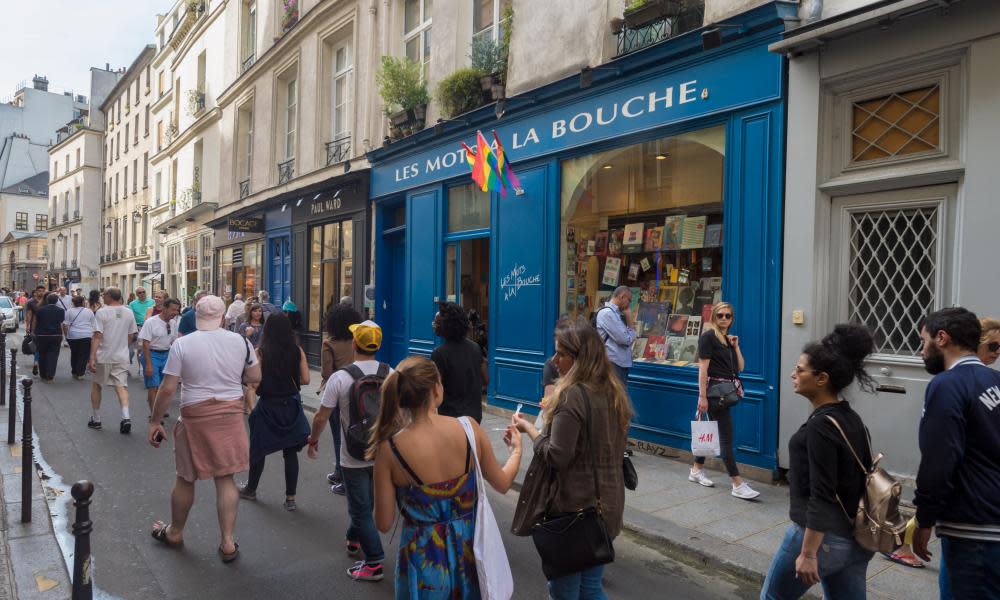Rent rises force revered LGBT bookshop out of Paris's gay district

In the window of France’s best-known gay bookshop, above the display of Lucian Freud art books, opera singer Maria Callas’s memoirs and a history of the Pride movement, a poster warns in giant red letters: “Cultural heritage in danger.” An urgent note on the door adds: “We need your help!”
Les Mots à La Bouche, a 40-year-old Paris institution, is the top LGBT bookshop in France and considered one of the best in the world – a focal point of Paris’s historic gay neighbourhood in the Marais district. But as property speculation in central Paris reaches dizzying heights – it is estimated that at certain times of year there are more Airbnb rentals than residents in the Marais – the bookshop is being forced out by rising rents.
Its departure is a blow to Paris’s gay community as activists warn that central Paris is destroying its cultural identity by allowing luxury fashion shops aimed at rich tourists to force out local businesses, including gay bars.
As the local cabaret star, Yvette Leglaire, said: “The gay Marais is dying.” The Paris tourist board still promotes the Marais as “an authentic yet trendy little village” but its gay scene, which began in the 1980s when the area was still working class, shabby and cheap, is slowly being eroded. Several historic gay bars have closed in recent years as fashion labels from Lacoste to Chanel move in.
The Marais’ Jewish area, situated around Rue des Rosiers, is not immune, with commercial rents doubling between 2012 and 2018. There are fears that, as with Barcelona or Venice, property speculation and commercial pursuit of profit from tourism will strip central Paris of its originality and local appeal. One long-term resident says the onslaught of luxury fashion brands is turning the Marais into “a giant, open-air duty free shop”.
Sébastien Grisez, manager at Les Mots à La Bouche, says: “Paris city hall promotes the gay history of the Marais and it has painted the crossroads here in rainbow colours, but no longer having our bookshop here seems absurd.”
The shop, which has been in the Marais since 1983, is open seven days a week until 11pm and stocks more than 16,000 titles. But like many historic gay bars that closed under pressure from rising rents, the shop has been given until March to find a new location elsewhere in Paris . There are rumours that a Doc Marten shoe shop will take its place.
Grisez says: “Ten years ago, there were far more gay bars here, now only a few are left. It’s true that gay sociology is changing – people are more spread out, there is perhaps less need to meet in bars when you can meet on apps. But even so, people regret that this neighbourhood meeting point is disappearing.”
Alain Lesturgez, who works for the forestry federation, has been coming to the bookshop for 20 years. He says: “This move would be the end of an era. It’s a place where a bookseller would take time to advise you. Once, the Marais had a lot of life, but now the luxury shops make it look the same as many other places in the world.”
At the Open Bar, a historic gay venue set up by rights activist Sébastien Fossa, the manager, says: “The neighbourhood is increasingly losing its soul. It started out as a working-class neighbourhood. Gradually, the arrival of luxury brands has broken the dynamic here.”
Fayçal Khiatine, who runs nearby gay bar Cox, says: “When a bookshop leaves, it’s daily neighbourhood life that will lose out.”
Christian Ducou, who was born and raised in the working-class Marais of the 1950s and 60s, looks out of his kitchen window at a shiny new two-storey Calvin Klein store. He has lived there since kids played in the street and many flats had shared bathrooms on the landing and no toilets. “The first rich person I saw was the photographer Helmut Newton when he moved here,” he says.
His wife, Liliane, says: “Strangely, these luxury shops are often empty. It’s as if they only set up here to have a Marais address. This neighbourhood just doesn’t seem to work as a place for luxury fashion shops. There are tiny narrow streets with no place for a limousine to park, yet they’re putting in the same extremely expensive shops you’d expect to see on a boulevard with chauffeur-driven cars waiting outside.”
As the spring mayoral elections approach, politicians are fretting about how to save central Paris’s soul from property speculation and intense tourism – or whether it’s already too late. David Belliard, a Green candidate, says the fact that Les Mots à La Bouche is being forced out of the Marais shows the French capital is being deformed and “now only aimed at tourists”. The local socialist mayor of the 4th arrondissement has promised to help the bookshop find a new location but, with a March deadline looming, one has yet to be found.
Sébastien Raymond, an actor, says: “This bookshop always felt like a cocoon. You knew you’d be accepted here. You felt safe.”

 Yahoo News
Yahoo News 
